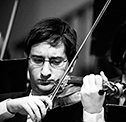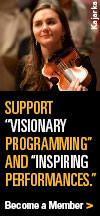Opening Chords from Hannibal
<< Return to concert description

“Looking in her eyes...I strangle her.” From his first appearance, the character of Will Graham in Hannibal (2015) is a contradiction. As an FBI profiler and a highly effective tracker of serial killers, he is ostensibly on the side of the good guys, but inside his head, he can vividly imagine himself as the vicious murderer. It’s how he solves crimes, of course, but the scenes are so real to him that eventually the lines become blurred. The imagined hunt for the next victim becomes an eagerly anticipated rush of heart-pounding excitement. The fantasy thrill of the kill becomes a visceral release. Does Will notice how his visualizations begin to leak out of his carefully constructed mental compartments? Does he fight it...or yearn for it? It’s such a treat to explore this fascinating character, especially against the backdrop of Sung Jin’s incredible composition. By layering chord over chord to create dissonances that find their way to resonance, the score reflects how terror and tenderness are interwoven in the characters. Traits and themes that “should not” exist together nevertheless create a living, complex whole. And as with all great art, it is in exploring humanity’s extremes—the worst depravities, the most intense passions—that we can begin to examine and make peace with the contradictions inside ourselves. It’s going to be quite a ride. I can’t wait! – tenor Ransom Bruce (Will Graham) on Sung Jin Hong’s Hannibal (2015)

The apple doesn’t fall far from the tree. One could surmise that Abigail Hobbs, through her charming and sweet demeanor, may be a Red Delicious apple from her father’s bloody orchard. Daughter of a deceased serial killer and victim of her own father’s knife, Abigail is tainted with childhood trauma and skills of a dark manipulator. She captures the essence of light and dark as she uses her naïve and protective nature to manipulate and lure people into the unexpected, perhaps into Hannibal’s next meal. While she feels nurtured and protected by Hannibal and Will, Hannibal takes advantage of her submissive ways and messes with her mind, spinning Abigail into series of darkness and delirium. What better way to set Abigail’s hysteria than a Mad Scene filled with relentless expressionism through sensual polychords? As a companion, Will tries to aid Abigail, revealing Abigail’s dark past and sending Will into hysteria as well. What will come of this tangled web of secrecy and demise? It is with great honor to perform Abigail’s Mad Scene and share this thriller opera under the baton of the composer Sung Jin Hong. – soprano Marie Putko (Abigail Hobbs) on Sung Jin Hong’s Hannibal (2015)

There is no denying that Hannibal Lecter has exquisite taste in music. This forces one to ask: how can a psychopathic murderer possibly appreciate the sublime beauty and heavenly elegance of such a work as Faure’s Requiem?
Human beings possess a dichotomy of traits, and struggle to keep their inner demons at bay. During times of grief, those malignant spirits threaten to consume our happiness, our clarity, and our love for humanity.
“You still wake up sometimes, don't you? You wake up in the dark and hear the screaming of the lambs.”
A lamb symbolizes the innocence of childhood, the belief that the world is a safe and nurturing place. As we get older and experience loss, that innocence can give way to anger and despair. Perhaps a requiem is one way to silence the cries of our deepest fears and losses, a way for us to find peace and comfort through the shared human experience.
Both “Sanctus” and “Agnus Dei” offer a taste of the Divine. Like the Lamb of God, “Sanctus” evokes imagery of virtue and humility. “Agnus Dei” begins with a soaring vocal line, merging into darker harmonies as the rest of the choir joins in. At times haunting in its demeanor, “Agnus Dei” touches on the darker side of humanity, while both movements remind us that life continues.
Human beings experience an intense spectrum of emotions, but what happens when we are mentally ill or incapacitated? No feeling can exist without its opposite. Do psychopaths still experience these emotional opposites if they are incapable of remorse?
Perhaps Hannibal constantly seeks the shreds of humanity he never possessed; maybe music is the only thing that can reach into the depths of his deranged soul. One World Symphony invites you to experience Faure’s Requiem with Hannibal... fava beans and a nice Chianti are optional! – Mezzo soprano Eva Sun on Gabriel Faure's Requiem and Sung Jin Hong's Hannibal (2015)

Much of the events in my singing career have happened as a result of some sort of energetic synchronicity. I sort of put it out in the universe either intentionally or unintentionally that I would like to explore some topic, some role, or some type of music, and sometimes this aligns with what the world has to offer in terms of potential performing opportunities. Hannibal was no exception to this seemingly magical rule. I had just completed a week-long marathon of binge-watching the TV series Hannibal and found myself completely enthralled with psychology behind this amazing character and the victims living and dead who are trapped in his web. I had become a bit obsessed with the show and quickly was a huge fan. Not even a week after having finished it, I received a call from the composer Sung Jin Hong, asking if I would like to play the role of Hannibal in his upcoming opera. Synchronicity strikes again! I was of course immediately on board with this!
I am greatly looking forward to exploring the psychology of this fascinating character and the way this is reflected in the richly symphonic and polytonal world of Hong’s music. Hong has explored other popular television shows within this medium before with his highly successful opera Breaking Bad — Ozymandias. I think of these works almost as a hybrid between opera and symphonic tone poems. They feel like something beyond an opera, but no less visceral or dramatically motivated. Hannibal for me is the embodiment of the soul unleashed from morals or societal regulation, and free to run wild through his hedonistic predilections. He’s an undomesticated animal with advanced critical thinking skills, a dangerous combination. However, what makes him most successful in his consumption of humanity is his charm, and that is what I hope to bring to this quiet devil of a “man.” – countertenor Nicholas Tamagna (Hannibal Lecter) on Sung Jin Hong’s Hannibal (2015)

 Hannibal Lecter did us all a service by eliminating an unskilled flutist from the “Baltimore Philharmonic Orchestra” in the opening sequence of the film Red Dragon, although serving the said flutist for dinner to the orchestra's board of directors may have been going a bit too far. Hopefully we won't be needing any such personnel changes at One World Symphony. Quid pro quo, Sung Jin. Quid pro quo. – Principal flute and nail artist, Chrissy Fong on Hannibal (2015)
Hannibal Lecter did us all a service by eliminating an unskilled flutist from the “Baltimore Philharmonic Orchestra” in the opening sequence of the film Red Dragon, although serving the said flutist for dinner to the orchestra's board of directors may have been going a bit too far. Hopefully we won't be needing any such personnel changes at One World Symphony. Quid pro quo, Sung Jin. Quid pro quo. – Principal flute and nail artist, Chrissy Fong on Hannibal (2015)

I am excited to perform the Aria from Bach’s Goldberg Variations. Considering that the modern day harp was not invented until the late 1800s, there is not any original music by Bach to perform on the harp. Instead, harpists like to ‘borrow’ from other instruments' repertoire, especially the piano or harpsichord, and arrange it for the harp. Given the demands of the Variations, it is very rarely performed on the harp but does work beautifully, especially the Aria.
The Aria is very fitting for this particular concert, as we are premiering Sung Jin Hong's opera Hannibal (2015). Those who have seen the movie The Silence of the Lambs may recall the gruesome scene in which Hannibal Lecter is awaiting his meal in his jail cell. Playing in the background, adding to the suspense and eeriness, is the Aria. After a viscous attack on two prison guards, Hannibal continues listening to the piece, covered in the blood of the guards he just killed. The simplicity and plaintive character of the piece provides a rather creepy juxtaposition to the grisly and violent killings that have just taken place. I have to wonder what Bach would have thought about his piece being used in such a setting! – Harpist Kristi Shade on Johann Sebastian Bach's Goldberg Variations

Kaija Saariaho (b. 1952 Helsinki) wrote Ballade for Emanuel Ax who premiered it in Birmingham ten years ago in November. Her language is distinctively mosaic and French, in the style of Olivier Messiaen. Mr. Ax had requested a solo piece in the form of a ballade, which Saariaho approached in a compact but flexibly metamorphic fashion. A sad character and a slow pulse occupy this work that she veils in shrouds of mysterious broken chords which recall the movement of natural elements like air and water. A melody surfaces and disappears organically within the structure. Saariaho's segmentary concept introduces frequent nervous outbursts to which any consumer of Harris’s psychological thriller is most susceptible. The human mind seems biochemically drawn to suspense; both Harris and Saariaho are masterful players in that field. Ballade’s sonorities rousingly echo the eerie symphonic selection all built around music from numerous adaptations of the cult work Hannibal. – pianist Markus Kaitila on Kaija Saariaho's Ballade (2005)

There’s a kind of legendary quality to The Rite of Spring, from its opening bassoon solo to the stories about the stunned Parisian crowd staging riots at the premiere. Its notion of spring being a struggle to take the land back from the long winter and its musical depiction of ritual sacrifice to pacify the pagan gods and end the long Russian winter was unlike anything before it. The work comes to a head in its final section, the "Sacrificial Dance," where the chosen virgin sacrifice dances herself to death. The already-in-your-face rhythms become even more savage and grueling as the ceremony begins, from the gyrations of the ever-changing meter to the pounding of the drums and bass instruments. Whether playing it or listening to it, you can do one of two things. You can either hold on for dear life, hoping for some kind of foothold to figure out what’s going on. Or you can embrace the cacophony and become one with the barbarism, let it become engrained in you as you offer your sweat and toil to the musical gods. – Concertmaster and violinist Michael Mandrin on Igor Stravinsky's The Rite of Spring (1913)

One might ask how this sublime, sacred piece fits with a TV series filled with violence, cunning and depravity. Yet, Hannibal is replete with contrasts. The seemingly innocent young girl, Abigail, is paired with the sinister Hannibal. Stunning landscapes and inspired cinematography serve as the backdrop to gruesome murders. While following Will’s tumultuous dreams, the audience is briefly uplifted by a flash of innocence and redemption. – soprano Laura Farmer on Gabriel Fauré’s “Pie Jesu,” Requiem (1900)

When I heard I would be in an opera based on the character Hannibal Lecter from Red Dragon and The Silence of the Lambs, I thought, “That’s Crazy!” But if you think about it, most operas are crazy. I am Mischa, Hannibal’s beloved younger sister who is killed during WWII. He finds out that she was eaten by starving brutal soldiers. He then remembers that he also ate her. This memory drives him completely insane. I think Mischa is a ghost that calls his name hoping to remind him that he is not a monster. She calls his name over and over trying to remind him that he once felt love for people. He loved his sister and his parents. She is not trying to torment him. She is trying to soothe him. But when he hears her, he feels loss and wants revenge for her horrible death. So actually Hannibal’s story is a perfect tragedy for an opera and I am so glad to be able to help tell it. – Jane Albert (Mischa Lecter) on Sung Jin Hong's Hannibal (2015)
Sunday, October 25, 2015
Holy Apostles Church
296 Ninth Avenue at West 28th Street
Manhattan





